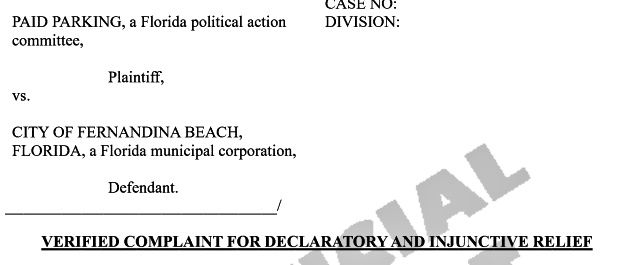Paid Parking foes Seek Court Order to Halt Program
- Mike Lednovich
- Nov 4, 2025
- 3 min read

A political action committee opposed to paid parking in downtown Fernandina Beach has filed a lawsuit asking a Nassau County judge to block the city from moving forward tonight with its parking management contract. But the city is pushing back, calling the request premature and an attempt to interfere with its legislative process.
A 27-page verified complaint, filed Friday by Paid Parking, a Florida political action committee in Fernandina Beach, seeks a court order halting the City Commission’s vote today to approve an agreement with One Parking Inc. to manage a 750-space “Red Zone” parking area in the historic district. The suit argues the plan violates state and federal religious-freedom protections, Florida disaster-recovery laws, and the Fernandina Beach City Charter’s referendum provisions.
According to the complaint nine churches are located in or near the proposed paid parking zone, four directly within it. The group claims requiring parishioners to pay for parking would “force them to pay a third party for the right to worship” — a violation of the Florida Religious Freedom Restoration Act, the Religious Land Use and Institutionalized Persons Act (RLUIPA), and the First Amendment.
The complaint also contends the paid parking plan amounts to a land-use regulation prohibited under Florida Statute §252.422, which bars new local land-development restrictions within a year of a declared disaster. Nassau County was included in federal disaster declarations following Hurricanes Helene and Debby in 2024
In a formal response filed Monday, City Attorney Teresa Prince countered that the lawsuit is premature because no ordinance has yet been adopted creating a paid parking district or authorizing fees. The agreement with One Parking, she wrote, is “contingent upon the City adopting the Proposed Enabling Ordinance,” which will only receive its first reading at the Tuesday commission meeting.
Prince wrote that the proposed ordinance is still in draft form and subject to change following public input and commission deliberation.
“Many concerns raised in the Plaintiff’s complaint may be resolved or addressed through the process of adopting the Proposed Enabling Ordinance,” the filing states. The city emphasized that handicap parking is exempt, and the ordinance allows the city manager to waive fees for weddings, funerals, and religious or civic services.
The city’s response called the PAC’s allegations “speculative” and the request for an emergency injunction “a drastic and extraordinary measure not necessary to preserve the status quo.”
Prince said courts should not intervene in legislative deliberations or substitute judicial judgment for local policy decisions.
The city noted that even if the agreement is approved, it will not take effect until the enabling ordinance is enacted. The proposed contract allows termination on 120 days notice and immediate cancellation if a citizen initiative against paid parking succeeds. Prince also pointed out that the city charter allows the commission to later amend or repeal any voter-approved initiative by a four-fifths supermajority vote, meaning “the referendum process is not being thwarted”
The city’s filing argues that the proposed program serves “legitimate municipal interests” — including sustainable funding for downtown infrastructure, improved parking turnover, and reduced congestion — and would shift some maintenance costs from taxpayers to tourists and visitors.
“The City Commission has not been afforded the right to exercise its legislative authority to discuss, consider and adopt the proposed ordinance,” the response says, calling the injunction request “an attempt to pre-adjudicate disputed legal issues that can be resolved on the merits in due course”
Nassau County Judge Marianne Aho had not ruled on the PAC’s emergency motion as of 2 p.m. today. If the court does not issue a ruling, the commission’s meeting will proceed with first reading of the enabling ordinance and consideration of the One Parking contract, as well as a resolution placing the anti-paid-parking referendum on the August 18, 2026 ballot.




Comments